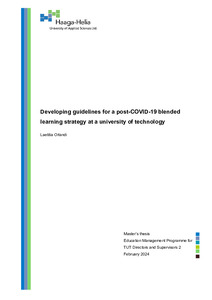Developing guidelines for a post-COVID-19 blended learning strategy at a university of technology
Orlandi, Laetitia (2024)
Orlandi, Laetitia
2024
All rights reserved. This publication is copyrighted. You may download, display and print it for Your own personal use. Commercial use is prohibited.
Julkaisun pysyvä osoite on
https://urn.fi/URN:NBN:fi:amk-202403013667
https://urn.fi/URN:NBN:fi:amk-202403013667
Tiivistelmä
During the COVID-19 pandemic, higher education institutions (HEIs) were catapulted into the digitalisation of education. Although the investigative exploration of online and blended learning drastically increased from 2017, very few HEIs were prepared for the overnight migration enforced by the global pandemic. The education sector is currently entering a post-COVID-19 future filled with uncertainty and lacking clear guidance. This qualitative study aimed to develop guidelines for a post-COVID-19 blended learning strategy within the Faculty of Arts & Design at the Tshwane University of Technology. For this purpose, a case study approach was used. The population sampling for the study was limited to academic staff who lectured within the Faculty of Arts & Design during the COVID-19 pandemic due to their experience of the phenomenon investigated. Data collection was conducted through an anonymous online survey questionnaire. Participation in the study was voluntary and anonymous and participants were able to withdraw from the study at any time without consequence. All ethical considerations and requirements of the Tshwane University of Technology were adhered to. The objectives of the study were explored through thematic analysis, identifying and interpreting patterns of meaning that emerged from the primary data collected. The first two research questions related to lecturers’ experiences of the benefits and challenges of the digitalisation of education within the Faculty of Arts & Design at the Tshwane University of Technology during the COVID-19 pandemic. The third research question explored lecturers’ views on the benefits and challenges of a continued blended learning approach in the post-COVID-19 future. Four superordinate themes emerged from the analysis of the data: 1) Digital advancement and limitations, 2) Student-centered learning and pedagogical innovation, 3) Resource optimisation, challenges and requirements, and 4) Guidance and support challenges and needs. From these four superordinate themes, specific recommendations are made for the development of guidelines for a post-COVID-19 blended learning strategy in the Faculty of Arts and Design at the Tshwane University of Technology.
